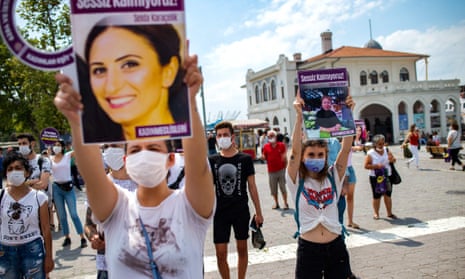The murder of a 27-year-old woman by an ex-boyfriend has sparked outrage in Turkey, shining a light on the country’s shockingly high femicide rate and government efforts to roll back legislation designed to protect women from gender-based violence.
The remains of student Pınar Gültekin were discovered in woodland in the Aegean province of Muğla on Tuesday. According to Turkish media, she was beaten and then strangled to death by her former partner, Cemal Metin Avci, who then burned her body in a garbage bin and covered it in concrete. The 32-year-old has been detained on homicide charges.
A vigil for Gültekin and other femicide victims was held in Istanbul’s Beşiktaş neighbourhood and three other cities across the country on Tuesday night. “We are here Pınar, we will hold them accountable,” women chanted while waving purple flags.
Kadınlar pek çok şehirde sokakta, meydanlarda#PınarGültekin#İstanbulSözleşmesiYaşatır pic.twitter.com/4TRHn8ADtO
— Filmmor (@Filmmor_) July 21, 2020
Violence against women and so-called “honour” killings are deeply rooted and prevalent issues in Turkey. According to a 2009 study on prevention strategies, 42% of Turkish women aged between 15–60 had suffered some physical or sexual violence by their husbands or partners.
Every year, the problem is getting worse: in 2019, 474 women were murdered, mostly by partners and relatives, the highest rate in a decade in which the numbers have increased year on year. The figures for 2020, affected by coronavirus lockdowns, are expected to be even higher.
Data on deaths is compiled from news reports and victims’ families by campaign group We Will Stop Femicide, which began tracking murders of women after the government admitted it did not keep records. Government statistics related to violence against women that do exist are unreliable and often differ from department to department.
“Violence against women is a problem everywhere. In Turkey we have a strong women’s rights movement but we also face a lot of opposition,” said Fidan Ataselim, We Will Stop Femicide’s general secretary. “In the last 20 years society has changed a lot: more women are demanding their right to work and go to university. The more choices we have, the more intense the backlash gets.”
Turkey was the first country to adopt a 2011 Council of Europe convention on gender-based violence and domestic violence, a groundbreaking legal framework designed to protect victims and effectively prosecute offenders, known as the Istanbul Convention.
Since then, however, even basic rights and protections won by Turkish women have come under threat as Recep Tayyip Erdoğan’s conservative Justice and Development party (AKP) has tried to roll back legislation politicians say threaten traditional family values.
Small but powerful lobby groups have repeatedly petitioned for changes to the Istanbul convention on the grounds that it encourages divorce and “immoral lifestyles”. The law’s future is currently being debated by parliament.
AKP deputy chair Numan Kurtulmuş said in a televised interview earlier this month that the Istanbul convention was “very wrong” and “played into the hands of LGBT and marginal elements” in Turkish society.
Other senior ministers, including Erdoğan, regularly make public statements that are degrading to women. According to the president, women are not equal to men, and those without children are deficient. Former prime minister Binali Yıldırım has told supporters that rather than physically attack women in public wearing shorts, they should verbally harass them instead.
“Comments like this from men in power legitimise these attitudes,” said Selin Nakipoğlu, a solicitor specialising in family law. “Our existing laws are actually strong, they’re just not enforced. On top of that, the government is trying to roll back things like child support and introduce mediation in divorce proceedings, even if there was violence in the marriage. An undercover journalist once rang the family consultation bureau and was told to pray and pacify her husband.
“Despite all of the government’s efforts, divorce rates are still going up. More and more women are rejecting these ideas.”
Turkey’s legal system, which has been purged of perceived disloyal elements and weaponised against the government’s critics since a failed coup attempt in 2016, is now even more unlikely to deliver timely justice for victims of male violence.
Men who say they acted on impulse, or who claim to be religious and dress smartly in court, are handed reduced sentences so often there is now a term for it: “tie reduction”.
Avci, Gültekin’s alleged killer, reportedly blamed his ex-girlfriend for his actions. “She threatened to let my wife know about the relationship. She was asking for money. I killed her in a moment of rage,” Turkish media quoted him as saying in his testimony.
Meanwhile, grief and rage continue to flood Turkish social media, with hundreds of thousands of tributes to the murdered student and other women like her.
“Pınar Gültekin’s murderer is among us, at our side, on our bed, at the bus stop, a step behind us ... They are not elsewhere, they don’t fall from the sky, they don’t come from space. This is why women’s murders, hate murders, are political,” actor Meriç Aral tweeted on Tuesday.
